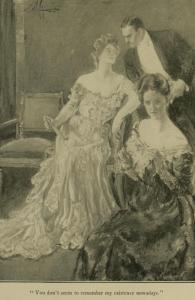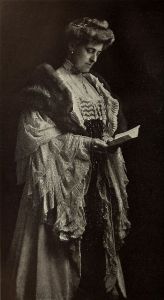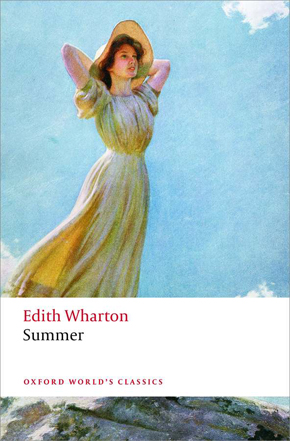A broken wing
by Laura RattrayWhen, towards the end of her life, Edith Wharton named her five personal favourite works among her fiction, one short novel featured on the list: Summer. Published in 1917, Summer was the most important work the writer produced during the years of the First World War. Despite Wharton’s own judgement, however, Summer has never found a place as one of her best-known works. On the one hand it stands in the shadows of her earlier story set in the Berkshires, Ethan Frome (1911); on the other, the “hot Ethan”, as Wharton herself jovially labelled it, fails to fit the mould for those who view her as the writer of society novels, set in the higher echelons of New York. Summer is the short novel that – like its author – invites the reader to look again.
Many of Wharton’s writings are renowned for capturing a dynamic moment of social transition (new money dwarfing the old, inherited income of the genteel classes; the newly minted trading their wares on the marriage market for the lustre of social acceptance; ambition and unsophisticated talent storming the bastions of the old, established order). In dramatic contrast, Wharton chooses as the setting of Summer a remote New England village that time and progress forgot. Its very name, North Dormer, suggests a soporific world. The novel’s young female protagonist, named Charity, is the ward of an old – or seemingly old – lawyer named Royall, who once tried to enter her bedroom (“I’m a lonesome man”). She was born among outlaws who live in squalor on a mountain above the hamlet. North Dormer’s residents insist on reminding “the girl”, as the text repeatedly identifies her at its opening, of her notorious origins. Inarticulate, uneducated, discontent, Charity in turn loathes North Dormer and her life there: her first words are the mantra of rebellious, dissatisfied youth, “How I hate everything!” Though not quite everything as it transpires.
With the mute, melancholy winter landscape of Ethan Frome giving way to North Dormer’s glorious summer, the novel is laden with a sensual portrayal of the surrounding countryside, with Charity’s sensitive, charged response to nature conveying her awakening sexual desire. Her ambition, however – like many of Wharton’s protagonists – is to escape. Temporary escape arrives from the city in the form of a cultured young architect, Lucius Harney, with whom Charity has a passionate affair. At the end of the summer, however, Charity is left behind and finds herself pregnant. There follows a temporary return to her birthright on the Mountain, an encounter of misery and degradation, before she is rescued for a second time and swiftly married to Lawyer Royall, the father figure whose authority she had always rebelled against.
Wharton’s narrative palate is much more varied than her critics care to acknowledge. Her focus moves from the social elite to classes on a sliding scale of privilege from shabby gentility to the working poor and beyond.”
Ethan Frome and Summer are traditionally regarded as the two exceptions to Wharton’s high society settings, yet the writer’s narrative palate is much more varied than her critics care to acknowledge. Her focus moves from the social elite to classes on a sliding scale of privilege from shabby gentility to the working poor and beyond, into the bowels of America’s underclass and the destitute. New York’s underclass opens up in the final sections of The House of Mirth as Lily Bart crashes down the social registers. Wharton’s unfinished plays also descend the social scale: a maid in Kate Spain is twisted by her brutal experiences into a life of blackmail and threats; an intriguing untitled play among Wharton’s manuscripts reveals an unmarried, pregnant maid and the social hypocrisies raining down on her from her elevated employers and their circle, one of whom is also pregnant by a lover. One woman is protected by marriage, position, money, and class; the other is threatened with destitution.
 The House of Mirth. Charles Scribner’s Sons, 1905. Wikimedia Commons” width=”195″ height=”300″>Wharton’s fundamental convictions were secure. She believed that women mattered as much as men, and her writing clinically exposes the hypocrisies, double standards, and lies that would deny them. Yet Wharton often portrayed exceptional women. Lily Bart has beauty, charm, and grace, though none of these gifts can ultimately save her. Ellen Olenska is refined, experienced, sensual, the exotic other, ruthlessly ejected from Old New York society. Laura Testvalley is a bridging figure between generations, helping her former charge Nan to happiness at the expense of her own. Charity Royall shares few of these exceptional women’s talents. She is uncouth, struggles to express herself – and she leaps to life on the very first page. Her name is both personal and symbolic. She is the local charity case, but in Wharton’s writing all women are cast by society as such – dependent on a father, husband, family member or distant relative, an uncertain employer. There are few options open to women, and in the battle between personal desire and social conventions, women generally lose.
The House of Mirth. Charles Scribner’s Sons, 1905. Wikimedia Commons” width=”195″ height=”300″>Wharton’s fundamental convictions were secure. She believed that women mattered as much as men, and her writing clinically exposes the hypocrisies, double standards, and lies that would deny them. Yet Wharton often portrayed exceptional women. Lily Bart has beauty, charm, and grace, though none of these gifts can ultimately save her. Ellen Olenska is refined, experienced, sensual, the exotic other, ruthlessly ejected from Old New York society. Laura Testvalley is a bridging figure between generations, helping her former charge Nan to happiness at the expense of her own. Charity Royall shares few of these exceptional women’s talents. She is uncouth, struggles to express herself – and she leaps to life on the very first page. Her name is both personal and symbolic. She is the local charity case, but in Wharton’s writing all women are cast by society as such – dependent on a father, husband, family member or distant relative, an uncertain employer. There are few options open to women, and in the battle between personal desire and social conventions, women generally lose.
Charity is the most openly sexual of Wharton’s characters in a narrative milieu in which protagonists often indulge only in affairs of the imagination. In some of the novel’s most evocative passages, Charity’s emerging sexuality is conveyed through her responses to nature:
She was blind and insensible to many things, and dimly knew it; but to all that was light and air, perfume and colour, every drop of blood in her responded. She loved the roughness of the dry mountain grass under her palms, the smell of the thyme into which she crushed her face, the fingering of the wind in her hair and through her cotton blouse, and the creak of the larches as they swayed to it. She often climbed up the hill and lay there alone for the mere pleasure of feeling the wind and of rubbing her cheeks in the grass.
Charity’s affair allows for a temporary suspension of reality, as she crosses the threshold on which she is situated at the novel’s opening and moves – in one of Wharton’s favourite motifs – “beyond”.
The behaviour of a man of means is judged on a very different scale from that of any woman, but Harney is no villain. Charity is a full, willing participant in their sexual relationship and she refuses to trap her man, keeping news of the pregnancy from him. She has seen the miserable fate of the girl who was married “to make things right”, seen “too many village love-stories end in that way.” Marriage in Wharton’s fiction can be a safety net, a calculated career move, or the most wretched of prisons. Often overlooked, however, is Wharton’s recognition of marriage as toxic for women and men. For better or worse, however, Royall will ultimately claim his (second-hand) prize. Harney possesses Charity for a summer; Royall will possess her for life.
Charity’s encounter on the Mountain is both a “tragic initiation” and valuable moment of painful affinity, a daughter now revisioning the mother she had always thought of as “destitute of all human feeling” into a figure who wanted to save her child from such a life. From this point, Charity’s thoughts turn to the future of her own unborn child. Making her weary journey back down the Mountain, Charity encounters Royall, who takes her to Nettleton and swiftly marries her, ensuring she will return to North Dormer as Mrs Royall.
 The World’s Work, published by Doubleday Page & Co., New York. Wikimedia Commons.” width=”164″ height=”300″>The conclusion of Summer remains one of the most hotly disputed of Wharton’s career. It has been interpreted as tantamount to a happy ending – or as close to a happy ending as the battle-hardened reader can hope of Wharton. In this reading, Royall saves Charity from the terrible consequences of her recklessness. Other readings, however, interpret the marriage and the ending as sick, grotesque, and ultimately bleaker than the death-in-life tableau framing Ethan Frome. Certainly Wharton’s imagery appears as both prophecy and warning. Through the wedding service, linked explicitly to the funeral episode, Charity is barely conscious, married without her explicit consent, dazed and confused, with a “feeling that if she ceased to keep close to him, and do what he told her to do, the world would slip away from beneath her feet.”
The World’s Work, published by Doubleday Page & Co., New York. Wikimedia Commons.” width=”164″ height=”300″>The conclusion of Summer remains one of the most hotly disputed of Wharton’s career. It has been interpreted as tantamount to a happy ending – or as close to a happy ending as the battle-hardened reader can hope of Wharton. In this reading, Royall saves Charity from the terrible consequences of her recklessness. Other readings, however, interpret the marriage and the ending as sick, grotesque, and ultimately bleaker than the death-in-life tableau framing Ethan Frome. Certainly Wharton’s imagery appears as both prophecy and warning. Through the wedding service, linked explicitly to the funeral episode, Charity is barely conscious, married without her explicit consent, dazed and confused, with a “feeling that if she ceased to keep close to him, and do what he told her to do, the world would slip away from beneath her feet.”
Charity is present at the ceremony only in body. The rebellious mantra of the opening has faded; rebellion is neutralised. The man she thought of as a father figure, the man who was part of everything she wanted to flee, is now her husband. The man who tried to cross the threshold of her bedroom in her youth will now finally possess her, sanctified by the law. A novel that began in the bloom of summer, with a young woman on the threshold of life, draws to a close in “the cold autumn moonlight”, Wharton deploying one of her most evocative images as Charity returns to a life she had sought to escape: “For an instant the old impulse of flight swept through her; but it was only the lift of a broken wing.” Is it for better or worse? Ultimately the writer portrayed as wary of modernism, leaves the question hanging and invites the reader to decide. “In the established order of things as [Charity] knew them she saw no place for her individual adventure…” Edith Wharton – against many odds – was a writer who ultimately found a place for her own individual adventure, and her 1917 novel stands as a powerful testimony to its rewards.
This is an edited extract from the introduction to a new edition of Summer from Oxford World’s Classics.
Laura Rattray is a reader in American Literature at the University of Glasgow. She has published widely on the life and work of Edith Wharton, serving on the executive board of the Wharton Society (2007–9) and the editorial board of The Edith Wharton Review (2008–present). She has edited The Unpublished Writings of Edith Wharton (2 volumes, 2009), Edith Wharton’s The Custom of the Country: A Reassessment (2010) and Edith Wharton in Context (2012). Edith Wharton’s Summer, edited and with an introduction and notes by Laura Rattray, is published by Oxford World’s Classics.
Read more.


